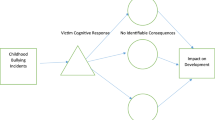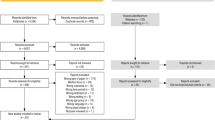Abstract
In this descriptive focus group study, we investigated parents’ views about child sexual abuse prevention education at home and in schools. Focus groups were conducted with a sample of 30 Australian adults who identified as the parent or caregiver of a child/children aged 0–5 years. The study explored (1) parents’ knowledge about child sexual abuse prevention, (2) the child sexual abuse prevention messages they provided to their children and the topics they discussed, (3) their attitudes towards child sexual abuse prevention education in schools, and (4) their preferences for content. Data analysis provided seven key themes in these four areas: knowledge (the inadequacy of their own prevention education; and how important is stranger danger now?); messages (bodies, touching, and relationships; the role of protective adults; and parent–child communication); attitudes (voice and choice); and preferences (not the nitty gritty, just the basics). The findings may be useful in assisting school authorities and providers of child sexual abuse prevention programs to better understand parents’ contributions to child sexual abuse prevention education, and their perspectives in relation to provision of school-based prevention programs.
Similar content being viewed by others
References
Australian Bureau of Statistics. (2011). 1370.0: Measures of Australia’s progress 2010. Commonwealth of Australia 2011. Retrieved April 5, 2011, from http://www.abs.gov.au/ausstats/abs@.nsf/mf/1370.0.
Australian Government, Office of the Privacy Commissioner. (2006). National privacy principles. Australian Government 200. Retrieved August 20, 2010, from http://www.privacy.gov.au/materials/types/infosheets/view/6583.
Bartholomew, L. K., Parcel, G. S., Kok, G., & Gottlieb, N. H. (2006). Planning health promotion programs: An intervention mapping approach (2nd ed.). San Francisco, CA: Jossey-Bass.
Berliner, L. (2011). Child sexual abuse: Definitions, prevalence, and consequences. In J. E. B. Myers (Ed.), The APSAC handbook on child maltreatment. Thousand Oaks, CA: Sage.
Berliner, L., & Elliott, D. M. (2002). Sexual abuse of children. In J. E. B. Myers, L. Berliner, J. Briere, C. T. Hendrix, C. Jenny, & T. A. Reid (Eds.), The APSAC handbook on child maltreatment. Thousand Oaks, CA: Sage.
Berne, L. A., Patton, W., Milton, J., Hunt, L. Y. A., & Wright, S. (2000). A qualitative assessment of Australian parents’ perceptions of sexuality education and communication. Journal of Sex Education and Therapy, 25(2&3), 161–168.
Briggs, F. (1988). South Australian parents want child protection programs to be offered in schools and preschools. Early Childhood Development and Care, 34, 167–178.
Campis, L. K., Prentice-Dunn, S., & Lyman, R. D. (1989). Coping appraisal and parents’ intentions to inform their children about sexual abuse: A protection motivation theory analysis. Journal of Social & Clinical Psychology, 8(3), 304–316.
Chen, J. Q., & Chen, D. G. (2005). Awareness of child sexual abuse prevention education among parents of grade 3 elementary school pupils in Fuxin City, China. Health Education Research, 20(5), 540–547.
Chen, J. Q., Dunne, M. P., & Han, P. (2007). Prevention of child sexual abuse in china: Knowledge, attitudes, and communication practices of parents of elementary school children. Child Abuse and Neglect, 31(7), 747–755.
Cicchetti, D., & Toth, S. (1995). The developmental psychopathology of child maltreatment. In D. Cicchetti & D. Cohen (Eds.), Developmental psychopathology. New York: Plenum Press.
Deblinger, E., Thakkar-Kolar, R. R., Berry, E. J., & Schroeder, C. M. (2010). Caregivers’ efforts to educate their children about child sexual abuse. Child Maltreatment, 15(1), 91–100.
Elrod, J. M., & Rubin, R. H. (1993). Parental involvement in sexual abuse prevention education. Child Abuse and Neglect, 17(4), 527–538.
El-Shaieb, M., & Wurtele, S. K. (2009). Parents’ plans to discuss sexuality with their young children. American Journal of Sexuality Education, 4(1), 103–115.
Finkelhor, D. (1984). Child sexual abuse: New theory and research. London: The Free Press.
Finkelhor, D., & Dziuba-Leatherman, J. (1995). Victimization prevention programs: A national survey of children’s exposure and reactions. Child Abuse and Neglect, 19(2), 129–139.
Goldman, J. D. G. (2008). Responding to parental objections to school sexuality education: A selection of 12 objections. Sex Education, 8(4), 415–438.
Goldman, R., & Goldman, J. D. G. (1982). Children’s sexual thinking. London: Routledge & Kegan Paul.
Hébert, M., Lavoie, F., Piché, C., & Poitras, M. (2001). Proximate effects of a child sexual abuse prevention program in elementary school children. Child Abuse and Neglect, 25(4), 505–522.
Hunt, R., & Walsh, K. (2011). Parents’ views about child sexual abuse prevention education: A systematic review. Australasian Journal of Early Childhood, 36(2), 63–76.
Kenny, M. (2009). Child sexual abuse prevention: Psychoeducational groups for preschoolers and their parents. The Journal for Specialists in Group Work, 34(1), 24–42.
Kenny, M. C. (2010). Child sexual abuse education with ethnically diverse families: A preliminary analysis. Children and Youth Services Review, 32(7), 981–989.
Kitzinger, J. (1994). The methodology of focus groups: The importance of interaction between research participants. Sociology of Health & Illness, 16(1), 103–121.
Kreuger, R. A., & Casey, M. A. (2000). Focus groups: A practical guide for applied research (3rd ed.). Thousand Oaks, CA: Sage.
Lehoux, P., Poland, B., & Daudelin, G. (2006). Focus group research and “the patient’s view”. Social Sciences & Medicine, 63(8), 2091–2104.
MacIntyre, D., & Carr, A. (2000). Prevention of child sexual abuse: Implications of programme evaluation research. Child Abuse Review, 9(3), 183–199.
MacMillan, H. L., Wathen, C. N., Barlow, J., Fergusson, D. M., Leventhal, J. M., & Taussig, H. N. (2009). Interventions to prevent child maltreatment and associated impairment. The Lancet, 373, 250–266.
Martino, S. C., Elliott, M. N., Corona, R., Kanouse, D. E., & Schuster, M. A. (2008). Beyond the “Big Talk”: The roles of breadth and repetition in parent-adolescent communication about sexual topics. Pediatrics, 121(3), 612–618.
Mikton, C., & Butchart, A. (2009). Child maltreatment prevention: A systematic review of reviews. Bulletin of the World Health Organization, 87(5), 353–361.
Montano, D. E., & Kasprzyk, D. (2008). Theory of reasoned action, theory of planned behavior, and the integrated behavioral model. In K. Glanz, B. K. Rimer, & K. Viswanath (Eds.), Health behavior and health education: Theory, research, and practice. Hoboken, NJ: Jossey-Bass.
National Health and Medical Research Council. (2007). Australian code for the responsible conduct of research. Commonwealth of Australia 2007. Retrieved April 28, 2010, from http://www.nhmrc.gov.au/publications/synopses/r39syn.htm.
Parker, A., & Tritter, J. (2006). Focus groups method and methodology: Current practice and recent debate. International Journal of Research and Method in Education, 29(1), 23–37.
Pereda, N., Guilera, G., Forns, M., & Gomez-Benito, J. (2009). The prevalence of child sexual abuse in community and student samples: A meta-analysis. Clinical Psychology Review, 29(4), 328–338.
Pohl, J. D., & Hazzard, A. (1990). Reactions of children, parents, and teachers to child sexual abuse prevention programs. Education, 110(3), 337–345.
Pullins, L. G., & Jones, J. D. (2006). Parental knowledge of child sexual abuse symptoms. Journal of Child Sexual Abuse, 15(4), 1–18.
Putnam, F. W. (2003). Ten-year research update review: Child sexual abuse. Journal of the American Academy of Child and Adolescent Psychiatry, 42(3), 269–278.
Queensland Government. (2011). Skilled and business migration. Queensland Government 2011. Retrieved April 17, 2011, from http://www.workliveplay.qld.gov.au/dsdweb/v4/apps/web/content.cfm?id=15055.
Sanderson, J. (2004). Child-focused sexual abuse prevention programs: How effective are they in preventing child abuse? Crime and Misconduct Commission Research & Issues Paper Series, 5(1), 1–8.
Stagner, M. W., & Lansing, J. (2009). Progress toward a prevention perspective. The Future of Children, 19(2), 19–38.
Stoltenborgh, M., van Ijzendoorn, M. H., Euser, E. M., & Bakermans-Kranenburg, M. J. A. (2011). Global perspective on child sexual abuse: Meta-analysis of prevalence around the world. Child Maltreatment, 16(2), 70–101.
Tang, C. S., & Yan, E. C. (2004). Intention to participate in child sexual abuse prevention programs: A study of Chinese adults in Hong Kong. Child Abuse and Neglect, 28(11), 1187–1197.
Taylor, P., Moore, P., Pezzullo, L., Tucci, J., Goddard, C., & De Bortoli, L. (2008). The cost of child abuse in Australia. Melbourne, VIC: Australian Childhood Foundation and Child Abuse Prevention Research Australia.
Trickett, P. K. (2006). Defining child sexual abuse. In M. M. Feerick, J. F. Knutson, P. K. Trickett, & S. M. Flanzer (Eds.), Child abuse and neglect: Definitions, classifications, and a framework for research. Baltimore, ML: Paul H Brookes Publishing Co.
Tutty, L. (1993). Parent’s perceptions of their child’s knowledge of sexual abuse prevention concepts. Journal of Child Sexual Abuse, 2(1), 83–103.
Tutty, L. M. (1997). Child sexual abuse prevention programs: Evaluating who do you tell. Child Abuse and Neglect, 21(9), 869–881.
Walsh, K., Brandon, L., & Chirio, L. (under review). Mother-child communication about sexual abuse prevention. Journal of Child Sexual Abuse.
Wurtele, S. K. (2009). Preventing sexual abuse of children in the twenty-first century: Preparing for challenges and opportunities. Journal of Child Sexual Abuse, 18(1), 1–18.
Wurtele, S. K., & Kenny, M. C. (2010). Partnering with parents to prevent childhood sexual abuse. Child Abuse Review, 19(2), 130–152.
Wurtele, S. K., Kvaternick, M., & Franklin, C. F. (1992). Sexual abuse prevention for preschoolers: A survey of parents’ behaviors, attitudes, and beliefs. Journal of Child Sexual Abuse, 1(1), 113–128.
Wurtele, S. K., & Miller-Perrin, C. L. (1992). Preventing child sexual abuse: Sharing the responsibility. Lincoln, NE: University of Nebraska Press.
Wurtele, S. K., Moreno, T., & Kenny, M. C. (2008). Evaluation of a sexual abuse prevention workshop for parents of young children. Journal of Child & Adolescent Trauma, 1(4), 331–340.
Author information
Authors and Affiliations
Corresponding author
Rights and permissions
About this article
Cite this article
Walsh, K., Brandon, L. Their Children’s First Educators: Parents’ Views About Child Sexual Abuse Prevention Education. J Child Fam Stud 21, 734–746 (2012). https://doi.org/10.1007/s10826-011-9526-4
Published:
Issue Date:
DOI: https://doi.org/10.1007/s10826-011-9526-4




